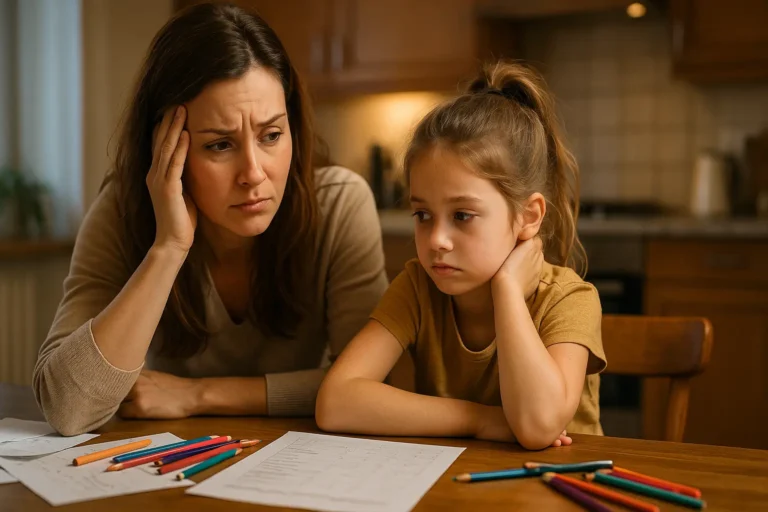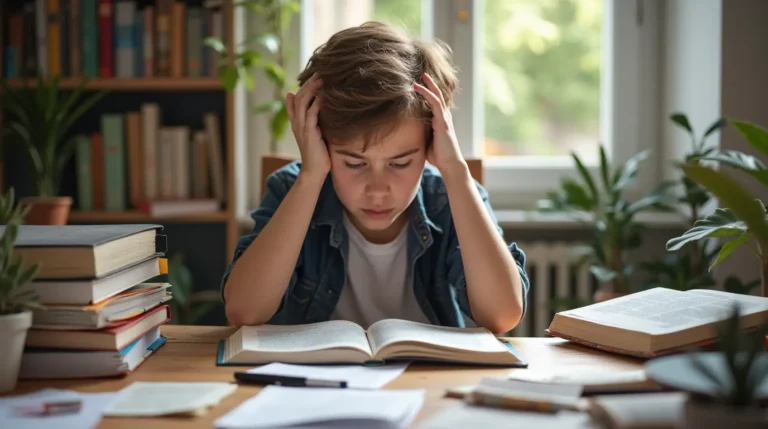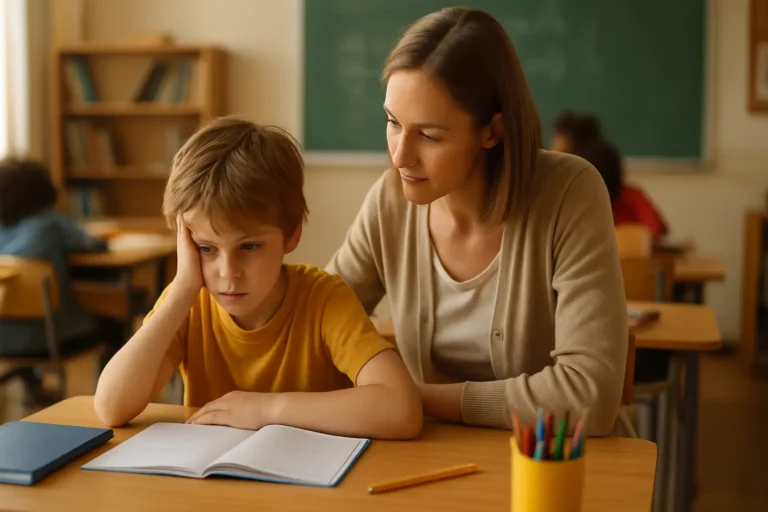ADHD and Sleep in Children : What is the sleep problem with ADHD?
You’re Not Alone in This Journey :
If you’re a parent of a child with ADHD, you likely know all too well the nightly struggle that can unfold at bedtime. The resistance, the multiple trips for water, the mysteriously urgent questions about dinosaurs at 9 PM, and the child who somehow finds boundless energy right when it’s time to wind down. You’re not alone in this challenge.
Sleep problems with ADHD children are incredibly common, affecting up to 70% of children with the condition according to the Journal of Attention Disorders. These sleep issues aren’t just inconvenient—they can create a difficult cycle where poor sleep worsens ADHD symptoms, and ADHD symptoms make quality sleep harder to achieve.
This comprehensive guide will walk you through understanding the connection between ADHD and sleep in children, the specific sleep challenges they face, and most importantly, practical, research-backed strategies to help your child (and your entire family) get the restful sleep everyone needs to thrive.
Understanding the Connection: Why ADHD Affects Sleep
The Neurological Factors
Children with ADHD experience several neurobiological differences that directly impact their ability to fall asleep and stay asleep:
- Disrupted melatonin production: Research from the Sleep Medicine Reviews shows that children with ADHD often have delayed melatonin release, the hormone responsible for triggering sleepiness.
- Dopamine regulation issues: ADHD is associated with differences in dopamine function, which plays a critical role in regulating sleep-wake cycles.
- Circadian rhythm disruption: Many children with ADHD have a naturally delayed sleep phase, meaning their bodies want to go to sleep later and wake up later than typical schedules allow.
“The neurobiological underpinnings of ADHD create a perfect storm for sleep difficulties. It’s not a behavior problem—it’s a brain difference.” – Dr. Stephen Faraone, ADHD researcher
Hyperactivity and the Busy Mind
The core symptoms of ADHD directly interfere with the calm state needed for sleep:
- Physical hyperactivity makes it difficult to physically settle down
- Mental hyperactivity (racing thoughts, busy mind) prevents mental relaxation
- Impulsivity may lead to resistance against sleep routines
- Sensory sensitivities can make children more reactive to environmental factors like light, sound, or tactile sensations from bedding
Medication Considerations
ADHD medications can have varying effects on sleep:
| Medication Type | Common Sleep Effects | Management Considerations |
|---|---|---|
| Stimulants (e.g., methylphenidate, amphetamines) | May delay sleep onset as medication wears off | Timing adjustments, shorter-acting options for afternoon |
| Non-stimulants (e.g., atomoxetine) | Generally fewer sleep impacts, but can cause daytime sleepiness | May be better option for children with severe sleep issues |
| Alpha-2 agonists (e.g., guanfacine, clonidine) | Often sedating, may help with sleep | Sometimes prescribed specifically to help with sleep |
Common Sleep Problems in Children with Attention Deficit Hyperactivity Disorder (ADHD)
Children with ADHD typically experience specific types of sleep disturbances:
1. Initial Insomnia (Difficulty Falling Asleep)
The most common sleep complaint, affecting up to 60% of children with ADHD according to the American Academy of Sleep Medicine. Children may lay in bed for 30+ minutes unable to fall asleep, often reporting their “brain won’t turn off.”
2. Sleep Maintenance Problems
Even after falling asleep, many children with ADHD experience:
- Frequent night wakings
- Restless sleep with tossing and turning
- Difficulty returning to sleep independently
3. Restless Leg Syndrome (RLS) & Periodic Limb Movement Disorder (PLMD)
Research from the National Sleep Foundation shows that RLS and PLMD are 2-3 times more common in children with ADHD. Signs include:
- Uncomfortable sensations in legs described as “creepy,” “crawly,” or “need to move”
- Repetitive leg movements during sleep (parents may notice repeatedly kicked-off blankets)
- Temporary relief with movement
4. Delayed Sleep-Wake Phase Disorder (DSWPD)
A circadian rhythm disorder where the body’s internal clock is significantly delayed:
- Natural tendency to fall asleep very late (often past midnight)
- Extreme difficulty waking for school if allowed to follow natural sleep pattern
- Normal sleep quality once asleep if allowed to sleep on preferred schedule
5. Sleep-Disordered Breathing
Sleep apnea and other breathing disorders occur at higher rates in children with ADHD:
- Snoring, gasping, or pauses in breathing during sleep
- Mouth breathing
- Unusual sleep positions (neck extended, sleeping sitting up)
6. Parasomnias
These sleep disturbances include:
- Nightmares
- Night terrors (appearing awake and distressed but actually asleep)
- Sleepwalking
- Sleep talking
7. Bedtime Resistance
While not a sleep disorder per se, extreme bedtime resistance is commonly reported:
- Multiple attempts to delay bedtime
- Frequent requests after being put to bed
- Emotional escalation at bedtime
- Leaving bedroom repeatedly
The Impact of Poor Sleep: A Cascading Effect
The consequences of insufficient sleep extend far beyond just feeling tired:
For the Child
Sleep deprivation amplifies ADHD symptoms:
- Worsened attention and focus
- Increased hyperactivity (paradoxically, sleep-deprived children often appear more hyperactive)
- Greater impulsivity and emotional dysregulation
- Compromised executive functioning
Academic consequences:
- Memory consolidation issues (sleep is when learning gets “locked in”)
- Reduced cognitive processing speed
- Difficulty sustaining attention in class
- Problems with higher-order thinking skills
Physical health impacts:
- Weakened immune function
- Potential metabolic effects
- Impaired physical growth (growth hormone is primarily released during sleep)
For the Family
- Parental sleep deprivation and fatigue
- Increased family stress and conflict
- Reduced quality time due to managing sleep problems
- Strain on parental relationship
A study published in the Journal of Pediatric Psychology found that parents of children with both ADHD and sleep problems reported significantly higher stress levels than parents of children with ADHD alone.
Actionable Strategies for Improving Sleep in Children with ADHD
Creating an ADHD-Friendly Sleep Environment
The right sleep environment is crucial:
- Temperature control: Keep the bedroom cool (65-68°F/18-20°C) as the ADHD brain may run “hotter” than neurotypical brains.
- Light management: Use blackout curtains to block outside light. Consider a very dim nightlight if darkness causes anxiety.
- Sound considerations: Many children with ADHD benefit from white noise machines to mask environmental sounds and provide consistent auditory input. The National Center for Biotechnology Information has studies showing this can be particularly helpful.
- Sensory-friendly bedding: Consider weighted blankets (approximately 10% of body weight), seamless sheets, or bedding materials specifically chosen for sensory needs.
- Clutter control: Keep the bedroom organized and visually calm, removing stimulating toys or electronics.
Optimized Bedtime Routines for ADHD Brains
A consistent routine is even more important for children with ADHD:
- Start earlier than you think necessary: Allow 45-60 minutes for the complete routine.
- Create a visual schedule: Use pictures or a checklist showing each step of the bedtime routine. The Child Mind Institute recommends physical charts rather than app-based ones to avoid screen exposure.
- Incorporate movement before settling: 10-15 minutes of gentle physical activity (stretching, yoga) can help discharge physical energy.
- Transition activities: Use gradually calming activities:
- Active play → Calm play → Bath → Books → Bed
- Sensory regulation techniques:
- Deep pressure input (firm hugs, massage)
- Heavy work activities (pushing against walls gently)
- Calming sensory tools (therapy putty, stress balls)
- Brain-dumping strategies:
- Keep a worry journal by the bed
- “Tomorrow list” to write down things to remember
- Brief time to talk through tomorrow’s plans
Screen Management Strategies
Digital devices are particularly problematic for children with ADHD:
- Implement a device curfew: All screens off 1-2 hours before bedtime with clear visual timers.
- Blue light management: Use blue light filters on all devices, consider blue-light blocking glasses from reputable sources like American Academy of Ophthalmology.
- Transition planning: Have a specific place outside the bedroom where devices “sleep” at night.
- Content awareness: Be mindful that children with ADHD may be more sensitive to exciting or stimulating content before bed.
Dietary Considerations
- Medication timing: Work with your doctor to optimize medication schedules.
- Caffeine awareness: Eliminate caffeine entirely or restrict to morning only (check hidden sources like chocolate and some medications).
- Evening meal planning: Balanced meals with complex carbohydrates and protein may help stabilize blood sugar during the night.
- Bedtime snacks: Small protein-rich snacks 30 minutes before bed can help prevent hunger wakings.
Relaxation Techniques Adapted for ADHD
Traditional relaxation methods often need modification for children with ADHD:
- Shorter guided meditations (5 minutes or less to start)
- Active relaxation techniques that incorporate gentle movement
- Progressive muscle relaxation with tactile prompts
- Breathing techniques with visual or tactile components (breathing buddies, finger tracing)
- Storytelling meditation that engages imagination while promoting relaxation
Medical and Professional Interventions
When behavioral strategies aren’t enough, consider professional help:
Sleep Assessment Options
- Sleep diaries: Track patterns over 2+ weeks using templates from the Sleep Foundation.
- Actigraphy: Wrist-worn devices that monitor movement to assess sleep-wake patterns.
- Polysomnography: Overnight sleep study to identify conditions like sleep apnea or PLMD.
Medication Considerations
Always consult with healthcare providers about medication decisions. This information is educational only.
- ADHD medication adjustments:
- Timing modifications
- Extended-release vs. immediate-release formulations
- Adding or adjusting afternoon doses
- Sleep-specific medications:
- Melatonin: Often used for children with ADHD with delayed sleep onset
- Typical doses: 0.5-5mg
- Timing: Usually 30-60 minutes before desired sleep time
- Forms: Regular and extended-release
- Alpha-2 agonists (clonidine, guanfacine):
- May help with both ADHD symptoms and sleep
- Often used when hyperarousal contributes to sleep difficulties
- Other options that should only be considered under medical supervision:
- Low-dose antihistamines
- Specialized sleep medications
- Melatonin: Often used for children with ADHD with delayed sleep onset
Therapeutic Approaches
- Cognitive Behavioral Therapy for Insomnia (CBT-I): Modified for children and ADHD
- Chronotherapy: Gradually shifting sleep schedules under professional guidance
- Light therapy: Strategically timed bright light exposure to reset circadian rhythms
Working with Schools and Healthcare Providers
School Communication Strategies
- Inform teachers about sleep challenges and potential impact on morning performance
- Request accommodations if necessary:
- Later start to school day when possible
- Scheduling demanding subjects later in day
- Understanding about tardiness related to sleep issues
- Create a morning routine that sets your child up for success
Healthcare Coordination
Before medical appointments, prepare by:
- Bringing sleep logs or diary data
- Documenting specific sleep behaviors and concerns
- Noting patterns related to medication, diet, or activities
- Preparing specific questions about sleep management
Download our ADHD Sleep Appointment Prep Checklist to help you make the most of medical visits.
Real Experiences: Parents Share Their Stories
“For years we struggled with Mason’s bedtime. He would be up until 11 PM despite starting our routine at 7. Working with his doctor to adjust his medication timing and adding a weighted blanket finally helped him settle. Now he’s usually asleep by 8:30, and his behavior and schoolwork have improved dramatically.” – Patricia, mother of 9-year-old Mason
“What worked for us was completely counter-intuitive. Our daughter actually needed more physical activity before bed, not less. Now we do 10 minutes of parent-child yoga right before stories, and it helps her regulate enough to fall asleep.” – Michael, father of 7-year-old Sophia
Frequently Asked Questions About Sleep in Children with Attention Deficit Hyperactivity Disorder
Can ADHD medication cause sleep problems?
Yes, stimulant medications can sometimes interfere with sleep by delaying the onset of sleepiness. However, for some children, properly timed medication actually improves sleep by helping manage ADHD symptoms that would otherwise disrupt bedtime. Work with your healthcare provider to find the optimal medication type, dosage, and timing for your child’s unique needs.
Is melatonin safe for children with ADHD?
Melatonin is generally considered safe for short-term use in children with ADHD under medical supervision. A 2019 study in the Journal of Child and Adolescent Psychopharmacology found it effective for sleep onset issues in children with ADHD. However, optimal dosing, timing, and long-term effects are still being researched, so medical guidance is essential.
What’s the best bedtime for a child with ADHD?
There is no one-size-fits-all bedtime for children with ADHD. The ideal bedtime depends on:
- Your child’s natural circadian rhythm
- Age-appropriate sleep needs
- School/activity schedule
- Medication considerations
Most elementary-aged children with ADHD need 10-11 hours of sleep, so work backward from wake time while allowing extra time for falling asleep.
How can I tell if my child’s sleep problem is ADHD-related or something else?
This distinction can be difficult to make without professional help. Sleep disorders like sleep apnea or restless leg syndrome can mimic or worsen ADHD symptoms. If your child experiences snoring, gasping, unusual leg movements during sleep, or extreme daytime sleepiness despite adequate sleep opportunity, consult with a pediatric sleep specialist.
Will my child outgrow these sleep problems?
Sleep challenges often evolve rather than disappear completely. Adolescents with ADHD typically experience a more pronounced delayed sleep phase, while bedtime resistance may decrease. Establishing good sleep habits in childhood creates a foundation for healthier sleep through all developmental stages.
Conclusion: Building Resilience Through Rest
Managing sleep problems with ADHD children requires patience, consistency, and often professional support. Remember that progress may be gradual, with setbacks along the way. Celebrate small improvements, and acknowledge the effort your child is making.
By addressing sleep challenges systematically, you’re not just improving nights—you’re transforming days. Better sleep leads to:
- Improved attention and focus
- Better emotional regulation
- Enhanced learning capacity
- Stronger family relationships
- Greater overall wellbeing
You’re not just helping your child sleep—you’re giving them the foundation to truly thrive with ADHD.
For additional support, consider joining the CHADD Parent Support Community or exploring resources through the American Academy of Sleep Medicine.
Disclaimer: This article is for informational purposes only and does not constitute medical advice. Always consult with qualified healthcare providers regarding sleep issues, ADHD management, and medication decisions.







